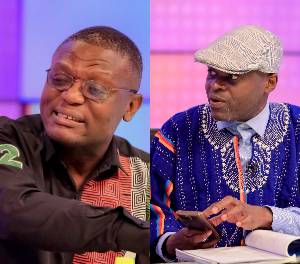Kofi Adams clashes with Martin Kpebu over constitutional crisis claims.
In recent weeks, Ghana’s political landscape has been marked by a public clash between Kofi Adams, a National Democratic Congress (NDC) Member of Parliament for the Buem Constituency, and Martin Kpebu, a renowned Ghanaian lawyer and social commentator. The two have expressed contrasting perspectives on whether Ghana faces a constitutional crisis, an issue that has implications for the rule of law and democratic governance in the country.
Martin Kpebu has been vocal in asserting that Ghana is indeed experiencing a constitutional crisis. He argues that the executive branch, under President Nana Akufo-Addo, has exhibited behaviors that undermine Ghana’s constitutional democracy. Kpebu’s critiques center on perceived abuses of power, including allegations of executive overreach, disregard for the rule of law, and the erosion of democratic institutions. His argument hinges on instances where he believes the government has failed to uphold the constitutional principles of checks and balances. One key example he cites is the tension between the judiciary and the executive, where he argues that the independence of the judiciary has been compromised, as well as the centralization of power within the executive branch, which he believes is a departure from the democratic ideals Ghana’s constitution embodies.
Kpebu’s claims resonate with some Ghanaians who share concerns about government accountability and institutional integrity. Over the years, Ghanaians have voiced worries about the power dynamics in governance, with concerns that the executive wielding too much influence can create an environment ripe for corruption and misconduct. His argument points to a structural problem that, if left unchecked, could result in diminished public trust in Ghana’s democratic institutions and processes. Kpebu has also suggested that these issues demand urgent reforms to restore the balance of power and reinforce the foundational principles of Ghana’s democracy.
On the other side of the debate is Kofi Adams, a staunch member of the opposition NDC, who disagrees with Kpebu’s assessment. Adams acknowledges challenges in the political environment but stops short of agreeing that Ghana is in a full-blown constitutional crisis. In his view, what Ghana is facing are rather issues stemming from poor governance practices and a lack of accountability. According to Adams, the term "constitutional crisis" would imply that the country’s constitutional order is on the brink of collapse, which he argues is an exaggeration.
Adams sees the current issues as serious but believes they can be addressed within the existing constitutional framework. He argues that Ghana’s institutions are resilient enough to withstand the pressures currently affecting the political sphere. Rather than focusing on a potential overhaul of the system, Adams advocates for bolstering institutional checks and reforms to enhance transparency and accountability. He asserts that, while there may be governance deficiencies, they do not amount to a constitutional collapse as Kpebu suggests.
The clash between Adams and Kpebu highlights a broader ideological divide regarding the state of Ghana’s democracy. Kpebu’s perspective raises questions about whether Ghana’s democracy is drifting from its foundational principles, potentially requiring more extensive reform to safeguard democratic norms. Meanwhile, Adams’s viewpoint suggests that, although reforms are needed, they can occur within the boundaries of the current constitution.
Ultimately, this debate reflects the complexities of Ghana’s democratic system and the differing interpretations of its resilience. The positions of Kpebu and Adams represent the challenges facing many democracies today—balancing executive power, preserving judicial independence, and maintaining public trust. As the nation approaches future elections, these discussions are expected to shape public opinion and potentially influence policy decisions on governance and constitutional matters. Whether Ghana is in a constitutional crisis or merely experiencing governance challenges, this dialogue underscores the importance of vigilance in protecting democratic principles and upholding the rule of law.




No comments yet
Be the first to share your thoughts!